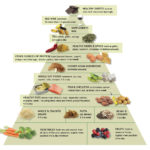Intermittent Fasting (IF)

What Is Intermittent Fasting?
Intermittent fasting (also sometimes shortend to IF) simply means occasionally going without food for longer than you typically would. This may involve skipping one meal a day, going without food or eating very little for an entire day once or twice a week, or even fasting every other day.
In one year-long study at the University of Illinois at Chicago, dieters alternated every other day between fasting (consuming only 500 calories on those days) and eating 2,500 calories on non-fasting days. Those who alternated between feasting and fasting lost as much weight as those in another group who consumed 1,500 calories per day throughout the year. However, the amount of weight lost by both groups was relatively modest – six percent for the fasters/feasters and 5.3 percent for those who cut calories to 1,500 per day. All the participants were sedentary, nonsmoking obese adults who didn’t have diabetes or cardiovascular disease. Bottom line: this study showed little difference in weight loss, adherence to the “diet,” or heart health compared to a weight loss plan that involved cutting calories.
Another type of intermittent fasting is eating within only certain hours of the day, a strategy called time-restricted feeding (TRF). The idea is to align eating with your circadian rhythm, the 24-hour cycle that governs when we wake, eat and sleep. Going against this cycle by eating or snacking late in the day has been described as a recipe for weight gain. A study published in June 2018 in the journal Cell Metabolism concluded that TRF improves insulin sensitivity and blood pressure and reduces oxidative stress and appetite.
How Healthy Is Intermittent Fasting?
Intermittent fasting appears to have similar health benefits to those that result from cutting daily calories by 15 to 40 percent – increased lifespan and a reduction of risks of diabetes, cardiovascular disease and cancer. To date, however, these results have been seen largely in studies with laboratory animals, not humans.
Some studies have suggested that intermittent fasting can improve cognitive function and protect against some of the damaging effects of Alzheimer’s disease and Parkinson’s diseases. The mechanism may be that fasting accelerates autophagy – the clearing out of waste left by dead and damaged cells. Autophagy’s failure to keep up with accumulated cellular debris may be one of the major causes of the chronic diseases associated with aging.
How Popular Is Intermittent Fasting?
Intermittent fasting has become increasingly popular in recent years, thanks largely to several best-selling books that have promoted this approach to weight loss. Beyond that, intermittent fasting may have gained popularity because some people think this approach to weight loss is easier to follow than cutting calories long term. However, since individuals who want to lose weight must undertake intermittent fasting on their own, no estimates are available as to how many have tried it and achieved their weight-loss goals or tried it and failed. Intermittent fasting is one of several popular diets reviewed on DrWeil.com.
General Principles Of Intermittent Fasting
By restricting the amount you eat on certain days (the “fast”) you reduce the number of calories you consume per week. Coupling intermittent fasting with time-restricted feeding has been shown to lower insulin levels, improve insulin sensitivity in people with pre-diabetes, and lower blood pressure. These changes are beneficial whether or not you lose weight. Restricting meals to an eight- to 10-hour window and consuming only healthy foods – no sweets or refined grains and no snacking or nighttime eating – make for an effective approach to weight loss.
What Can You Eat?
You supposedly can eat anything you want on the feasting days but very little only 500 calories per day when fasting. It is recommended that the 500 calories allowed on fasting days be restricted to fat or protein, such as fish, eggs and nuts, not carbohydrates. However, you aren’t supposed to go wild on feasting days – the idea is to eat nutritious, healthy foods fruits and vegetables, healthy protein and fats, while avoiding sugar, refined grains and processed foods. On fasting days you can drink as much tea and coffee as you want providing you don’t add sugar or cream.
How Many Calories On A Typical Intermittent Fasting Diet?
In general, intermittent fasting requires cutting the normally recommended daily calories by 75 percent on fasting days so that women would consume about 500 calories and men 600. No calorie restrictions apply to feasting days. In both instances, if your plan involves time restricted feeding, you have to consume all your food within the hours specified.
What Do Doctors Say?
Doctors familiar with the medical literature on intermittent fasting are aware that it can be effective, although it hasn’t been shown to work any better than other weight loss plans. Evidence that limiting the span of hours in which you eat has generated medical interest as means of benefiting health as well as losing weight.
Dr. Weil’s Take On Intermittent Fasting:
Dr. Weil doesn’t recommend intermittent fasting for everyone. He says that children under 18 should not fast, nor should diabetics, nor pregnant or lactating women. And he notes that some health conditions – such as severe gastrointestinal reflux disease (GERD) are easier to manage when food intake is more regular.
He also suggests that based on what we now know of the health benefits of intermittent fasting, we should rethink what seems to be a modern cultural imperative: to avoid hunger at all costs. In fact, letting yourself get hungry now and then is clearly a healthy practice, as long as your overall caloric intake stays high enough to maintain normal weight. Many people who follow intermittent fasting regimes report both physical and mental benefits, including improved energy and concentration, better sleep, and an overall feeling of well-being
Sources:
Krista A. Varady et al, “Effect of Alternate-Day Fasting on Weight Loss, Weight Maintenance, and Cardioprotection Among Metabolically Healthy Obese Adults: A Randomized Clinical Trial.” JAMA Internal Medicine July 2017, doi: 10.1001/jamainternmed.2017.0936
Elizabeth F. Sutton et al, “Early Time-Restricted Feeding Improves Insulin Sensitivity, Blood Pressure, and Oxidative Stress Even without Weight Loss in Men with Prediabetes,” Cell Metabolism, June 5, 2018, https://doi.org/10.1016/j.cmet.2018.04.010














